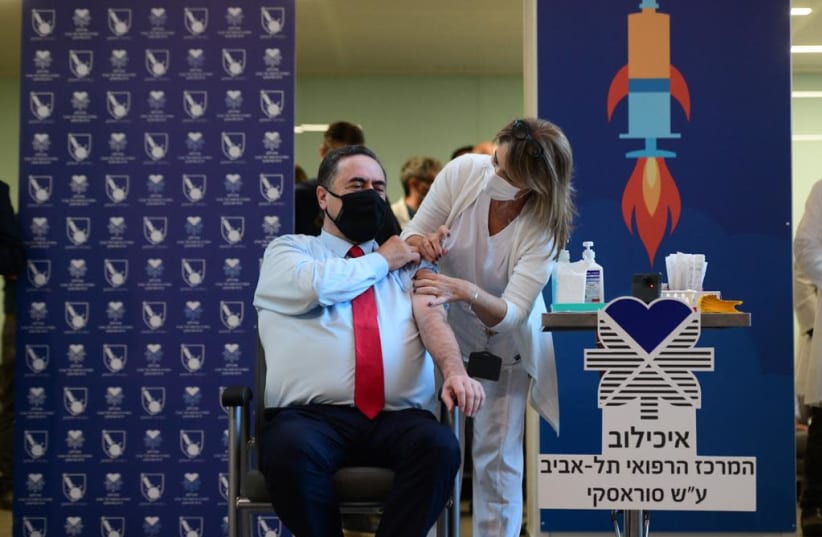The coronavirus cabinet is expected to meet on Tuesday to weigh options amid the surging virus outbreak alongside the country’s rapid vaccination campaign.
“We are in a very difficult outbreak, probably in a more difficult situation than we were at the beginning of September,” Edelstein said during a visit to a Clalit vaccination center in Nazareth. He said that his recommendation would be a closure that will last two weeks. “This disease should be given one strong blow.”
Cabinet ministers are expected to evaluate various recommendations by the Health Ministry, including reducing the number of people who can go to work at businesses that do not welcome the public from 50% to 30%, and reducing public transportation. However, the biggest battle is expected to be waged over whether schools should close.
The ministry wants the entire system shut down, but is likely to compromise on an outline by which preschools and children in grades 1-4 and 11-12 could go to school in yellow and green cities, while students in grades 5-10 would learn at home.
Education Minister Yoav Gallant said he would support the compromise plan as did the head of local authorities, Haim Bibas."I call on my colleagues in the government to unite behind Prime Minister Benjamin Netanyahu and immediately approve the outline for operating the education system during the closure period, as approved by the government and rejected by the Knesset Education Committee,” Gallant posted on his Facebook page Sunday evening, referring to the plan that was first passed by the government almost two weeks ago, but overturned by the Knesset.
“The adoption of the outline will help maintain the health of the students and teaching staff along with an appropriate educational response,” Gallant said in a video message.
Prof. Ran Balicer, Chairman of the National Expert Advisory Panel to the Government on COVID-19, told The Jerusalem Post that when the experts originally made their recommendation to shut down most higher grades because of the dissemination of the disease and the need to curb it.
“Our recommendation was accepted by the cabinet, but ruled out by the Knesset committee and all education opened as usual in the yellow and green areas,” he said. “I think that our original recommendation should definitely come into play now.”
But Blue and White ministers, including Alternate Prime Minister Benny Gantz and Science and Technology Minister Yizhar Shay, are not expected to vote in favor. They say they would like to wait two weeks from the start of the closure, which would be next Sunday, to fully evaluate its effect and only then make decisions.
Moreover, the head of the Knesset Education Committee, Ram Shefa, has said that his stance has not changed and he will not allow schools to be shut.
All the while, the number of infected students continues to climb. There are currently 10,000 students with the virus and another 2,000 teachers. However, recent data from the Education Ministry showed that more than 85% of infections of students and teachers do not occur at school.
Nonetheless, even as the school system is open, it is not able to fully operate.
Additionally, the teachers, who have been pressing to get vaccinated as long as schools are open, have not been given the green light to get the jab.
“In all the chaos that Israel has gone through, there is no system that has been more deeply abused than the education system,” said the National Student and Youth Council in a statement on Sunday.
“Now, the Health Ministry is working to lock us students back in our homes just before the winter matriculation exams… The youth have become a scapegoat of the system.”
But the numbers speak for themselves: There were 4,141 people diagnosed with the virus on Saturday, the Health Ministry reported and another 2,540 on Sunday between midnight and press time. Some 761 people were hospitalized in serious condition, including more than 100 who were intubated.
More than 50 people died over the weekend, bringing the death toll to 3,412.
Some 264,000 people are in isolation.
“Yesterday, 4,000 people were diagnosed,” said Dr. Sharon Alroy-Preis, head of public health services, in an interview with Army Radio on Sunday morning. “If you ask who is winning, the virus or the vaccines, then the virus is winning.”
Health Ministry Director-General Chezy Levy told KAN News that, “We will finish vaccinating about two million Israelis by the end of the month. This will reduce morbidity, but it is still not enough to say ‘no more restrictions.’”
He, like the health minister, said that “severe restrictions must be imposed.”
Nonetheless, businesses are threatening that either the government must make a decision once and for all to totally shut down, or they are opening up.
Several business associations banded together on Sunday and told the prime minister that if a total lockdown is not voted on in the next day, they will open up on January 10, regardless of the rules.
“There is not much left to close down,” Balicer told the Post. He said that now it is “about conveying a message to the public how serious things are, how widespread the disease is.”
He added that the situation is “indeed serious.”
